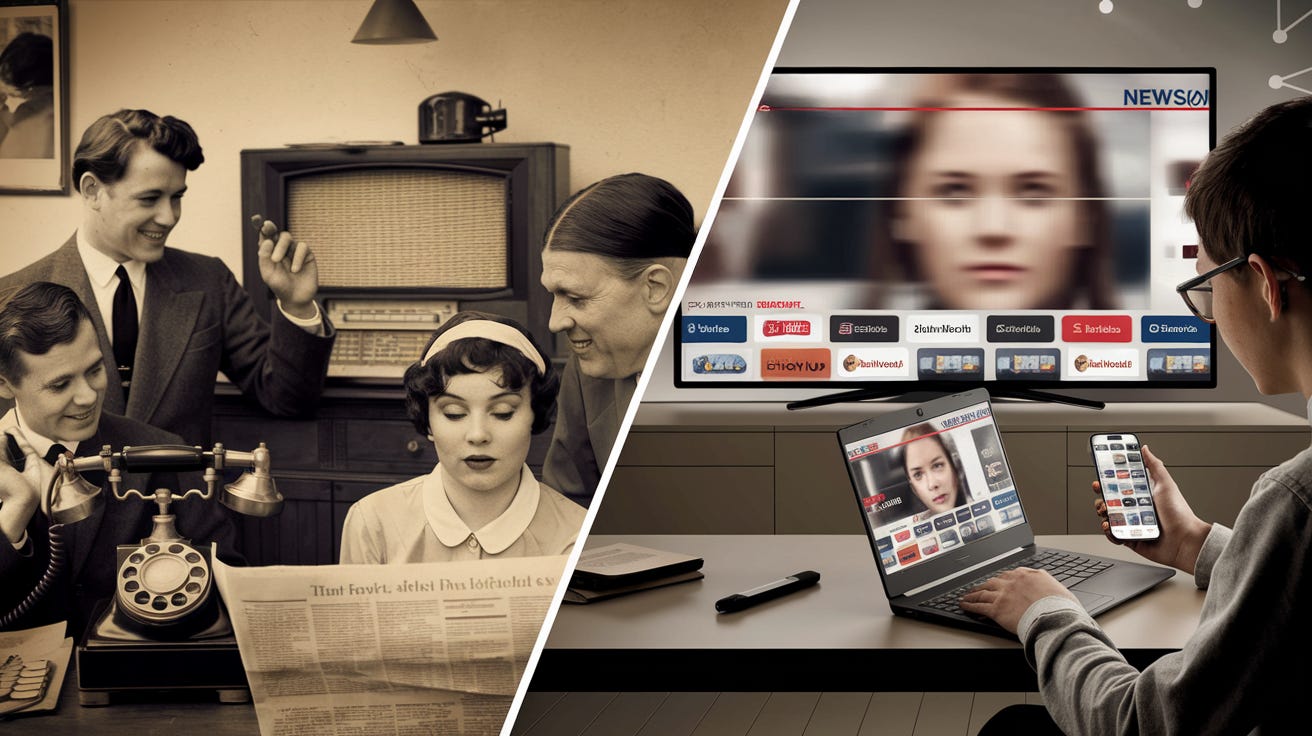TL;DR: Our unprecedented access to information has paradoxically damaged our ability to think critically and discern truth, creating an urgent need to balance healthy skepticism with trust in objective facts.
As a doctor of philosophy, I am constantly drawn to metacognition—thinking about thinking itself. This reflection has taken on new urgency as I observe how our world's dramatic increase in information flow has paradoxically degraded our collective ability to think clearly. My position in time offers a unique vantage point for this observation. As the youngest child of a father who was 52 when I was born, I straddle two distinctly different eras of human knowledge and technology.
When I was thirteen, my father was the age I am now. Those teenage years gave me fully formed thoughts but limited life experiences, combined with memories of thoughtful conversations as I learned from those around me. This perspective now allows me to look at our world with fresh eyes and consider how I might contribute to it as it is rather than as I once imagined it.
The world of my father's birth would be almost unrecognizable to today's youth. It was predominantly agrarian, with industrialization confined to select regions. Edison and Ford were the era's technological pioneers, introducing innovations like electricity and the internal combustion engine. Communication moved at the pace of letters and shared party-line telephones. Medical knowledge was basic; tuberculosis and smallpox remained deadly threats. Colonial powers still carved up the globe, women largely lacked voting rights, and the Wright brothers had only recently proved powered flight possible. Space travel existed solely in the realm of imagination.
The contrast with our present reality is stark. We live in an interconnected, urbanized world where artificial intelligence, smartphones, and the internet reshape our daily existence. Medical advances have revolutionized human health and longevity through antibiotics, vaccines, and gene therapy. Humans have walked on the moon, and robots explore Mars. Decolonization has reshaped the global political landscape, while social movements have advanced human rights significantly. Video calls span continents, and cars are beginning to drive themselves—developments that would have seemed like science fiction to my father's generation.
My father's habits reflected his era: he never stopped calling the refrigerator "the icebox," remained loyal to his percolator for Maxwell House coffee, and cherished his collection of phonograph records. Similarly, I find myself clinging to conventional media sources and scientific publications, increasingly aware of their limitations as I encounter poorly reported science and sensationalized conclusions from well-meaning but misguided sources.
However, these traditional media shortcomings pale compared to today's challenges: a landscape of fragmented information sources and bad actors promoting dangerous conspiracy theories with real-world consequences. The situation grows more complex as AI-generated content becomes increasingly convincing and more difficult to distinguish from reality. We face a fundamental dilemma: how do we cultivate healthy skepticism without undermining the very concept of objective truth?
This question becomes more crucial as we navigate an era where information abundance paradoxically leads to knowledge scarcity. The answer may be understanding how different generations process information and learning to bridge these perspectives. By combining the careful skepticism of traditional media consumption with modern digital literacy, we might find a path forward that preserves truth while acknowledging the complexity of our information ecosystem.
As we approach 2025, we must acknowledge a stark reality: the guardrails that once guided traditional media toward truth have vanished in our digital age. The responsibility for maintaining information integrity now falls to each of us. While my father's generation relied on trusted news anchors and ethical editors to verify facts before publication, we must now become our own fact-checkers in this new frontier. The good news? Every individual who commits to information responsibility creates a ripple effect, influencing their network to do the same. Let’s resolve to:
Support information guardrails by fact-checking before sharing, following and verifying sources to their origins, and learning to recognize AI-generated content. These habits require thinking, but they will become second nature with practice.
Actively share verification with others, not just the verified information itself. When we explain how we determined something to be true or false, we empower our network with critical thinking tools they can use themselves.
Create accountability circles within our communities—whether online or offline—where we normalize asking "How do you know that?" and "What's your source?" not as challenges, but as expressions of shared commitment to truth. We may not be able to change someone else’s mind, but we can certainly change our own.
The future of our collective wisdom depends not on the volume of information we can access, but on our ability to create and maintain these new social guardrails together. Each person who joins this effort strengthens the network of truth-seekers, making it progressively harder for misinformation to spread. Let this be the year we transform from passive consumers to active stewards of truth, one person, one share, one conversation at a time.





